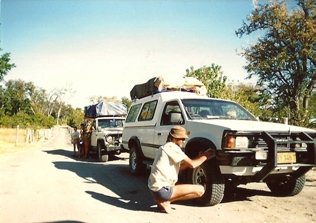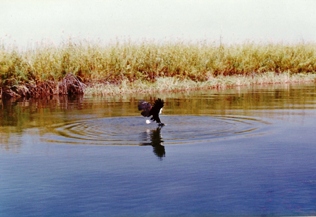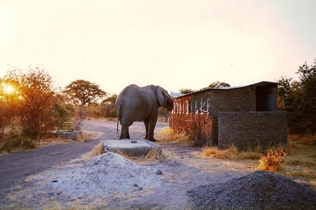Self Drive
4x4 Africa Adventures
- Home
- Botswana
- Zimbabwe
- Mozambique
- Travel Channel
- Contact Us
Botswana Border Posts - Procedures
- Documents Required:
Valid passport.
Original vehicle registration papers:
Note that a certified copy is acceptable at the border post. Persons whose vehicles are still being financed by the bank will not have original vehicle registration papers. They would therefore use the vehicle license papers (where the renewal disk is cut out yearly), or, vehicle license papers: Must be accompanied with a letter from the bank giving you authorization to take the vehicle across the border, and must indicate dates. Both the bank letter and license papers should be signed by a Commissioner of Oaths. If you are not the registered owner of the vehicle: Please carry an affidavit from the police giving you authorization from the owner / financial institution to take the vehicle abroad. - Border Charge:
Road Transport Permit - P40
National Road Safety - P20 - valid for a calendar year (up to 31 December) P20 will also be charged on a trailer
Third-Party Insurance - P50 - motor vehicle insurance (mini buses and buses will pay a higher fee)
Temporary Import Permit - TIP - this form will be issued at the border post on entry.
ZA Sticker
Valid Drivers Licence - Currency: Pula (BWP)

Botswana Border Post - Times and Telephone Numbers
Bray:
- 07:00 - 16:00 (053) 937 0026
Derdepoort (Sikwane):
- 06:00 - 19:00 (014) 778 0725
Groblersburg (Martin's Drift):
- 08:00 - 18:00 (014) 767 1019
Kopfontein (Tlokweng):
- 06:00 - 00:00 (018) 365 9055
Makopong:
- 08:00 - 16:00 (053) 922 Vorstershoop 2011
McCarthy's Rest:
- 06:00 - 18:00 (053) 781 0285
Middelputs:
- 07:30 - 16:00 (053) 781 0212
Platjan:
- 08:00 - 16:00 (015) 575 1040
Pontdrift:
- 08:00 - 16:00 (015) 575 1056
Ramatlabama:
- 06:00 - 22:00 (018) 390 2533
Skilpadshek (Pioneer Gate):
- 06:00 - 00:00 (018) 366 0011
Stockpoort (Parr's Halt):
- 08:00 - 18:00 (014) 763 4586
Swartkopfontein (Ramotswa):
- 06:00 - 22:00 (018) 365 9010
Twee Rivieren (Two Rivers):
- 07:30 - 16:00 (014) 763 4586
Zanzibar:
- 08:00 - 16:00 (014) 767 1024

Customs
Baggage Declaration
What You Must Declare
• All goods acquired outside Botswana in your possession, including items you received as gifts, such as wedding or birthday presents.
• Repairs or alterations to any items or vehicle you took abroad and then bring back, even if the repairs/alterations were performed free of charge.
• Items you bought in any duty-free shop including such items bought duty-free on aircraft or ship.
• Items you are bringing home for someone else.
• Items you intend to sell or use in your business.
To Avoid Delays with Baggage Declarations
• Please produce all receipts and sales slips for goods purchased outside Botswana.
• If you are unsure of the goods and values, which you should declare, ask for assistance from the customs officer.
Duty Free Allowances
• Personal effects, sporting and recreational effects, new or used –
o imported by non-residents of Botswana for their own use;
o imported by persons making a bona-fide change of residence to Botswana.
o Exported by residents of Botswana for their own use whilst abroad and subsequently re-imported by such residents. The goods must be identifiable as those exported from Botswana.
• The following articles and consumables (excluding any goods the importation of which is prohibited), declared at the place where the traveller enters Botswana and not imported on behalf of other persons or by way of trade, may be admitted free of duty and, where applicable, Value Add Tax (VAT).
o Wines - 2 liters
o Spirituous and other alcoholic beverages - 1 litre
o Cigarettes - 200
o Cigars - 20
o Cigarette or pipe tobacco - 250 gms
o Perfume - 50 ml
o Toilet water - 250 ml
o Other new or used goods of a total
• Value not exceeding (from outside SACU) - 3000 UA*
o Other new or used goods of a total
• Value not exceeding (from SACU) - 500 UA*
*UA is equivalent to One South African Rand.
Additional goods imported from outside SACU, new or used of a total value not exceeding 12 000 UA* per person, excluding the consumable items detailed above, are admissible at a flat rate of 20%, if the owner so elects.
Notes:
• Duty will be payable at the applicable rates where travellers import goods exceeding the above allowances. Travellers importing goods for business or commercial purpose will not qualify for the above allowances.
• The concession for new and used goods specified above do not apply to such goods imported by residents of Botswana returning after an absence of less than 48 hours;
• With the exception of those relating to tobacco and alcoholic products, the concessions may be claimed by children under the age of 18 years, whether or not their parents or guardians accompany them, provided the goods are for use by the children themselves.
Prohibited and Restricted Goods
Prohibited Goods
The importation of, among other things, the following goods into Botswana is completely prohibited. It is illegal to be found in possession of prohibited goods and may result in seizure and prosecution. These include:
• Narcotic, habit-forming drugs and related substances in any form.
• Military firearms, ammunition and explosives
• Indecent and obscene material such as pornographic books, magazines, films, videos, DVDs and software
Restricted Goods
These are goods, which you cannot import without authority such as a licence or a permit. Further details regarding restrictions on the importation of agricultural products can be obtained from the Director of Animal Health and Production, Private Bag 0032, Gaborone and the Director of Crop Production and Forestry, Private Bag 003, Gaborone.
The following consumer goods may be imported for private use without an import permit provided they do not exceed the maximum allowable quantities.
| Products | Maximum Quantity |
| Red meat, goat/lamb Poultry meat Tinned poultry meat Eggs Fresh milk Maize and maize products Wheat Pulses (beans, peas, lentils) Sorghum and sorghum products Cabbage Onions Potatoes Oranges Tomatoes Choumollier Rape Spinach Bread loaves |
25 kg per family 5 kg per person 20 kg per person 36 eggs per person 2 liters per person 25 kg per person 25 kg per person 25 kg per person 25 kg per person 1 bag per person 1 bag per person 1 bag per person 1 bag per person 1 box per person 2 kg per person 2 kg per person 2 kg per person 6 per week |
The regulations on importing meat and meat products change frequently because they are based on disease outbreaks in different countries, always ask your nearest customs office before importing meat and meat products.
Domestic Pets
Note: A valid Certificate of Identity, Rabies Vaccination and Movement Permit issued in Lesotho, Malawi, South Africa, Swaziland, Namibia or Zimbabwe will be accepted at the time of importation into Botswana.
Plants and Soil
Note: South African transit permits may also be required in respect of plants shipped through South Africa. Details may be obtained from the Director of plant Control and Quarantine, Private Bag X179, Pretoria, South Africa.
Soil is considered the loose surface material of the earth in which plants, trees and scrubs grow. In most cases the soil consists of disintegrated rock with an admixture of organic material and soluble salts. The importation of soil is prohibited unless accompanied by an import permit from the Director of Crop Production and Forestry, Private Bag 003, Gaborone.
Motor Vehicles and Boats
Non-residents visiting Botswana and coming from a country outside the Southern African Common Customs Area for a limited period are normally required to produce a carnet, triptyque or bill of entry (any duty liability thereon being secured by bond or cash deposit) in respect of their motor vehicles. (Note: The Southern African Common Customs Area comprises Botswana, Lesotho, South Africa, Swaziland and Namibia)
A simplified system involving a Temporary Import Permit is applied to motor vehicles, the bona fide property of a resident of Malawi, Mozambique or Zimbabwe, and a similar system is applied reciprocally between Zambia and Botswana.
Residents of Botswana are not allowed to drive or use foreign registered vehicles in the Botswana for more than fourteen days after importation of such vehicle. If you are intending to do so please contact your nearest customs office for advice. Should you be found in possession of a foreign registered vehicle severe penalties including seizure of vehicles may be imposed.

Import / export of products for personal consumption
There are standing bilateral agreements between the veterinary services of Botswana and South Africa and between Botswana and Namibia that allow for travelers moving across the three countries to carry with them limited amounts of animal products as part of personal luggage without the need for an import/export permit and intended for their personal use. Such products may not be sold or disposed of in any way other than by own consumption / use.
Please find below the products and quantities allowed into Botswana without a South African or Namibian veterinary export certificate provided they originate from FMD free areas of the respective countries:
| Product/ Commodity | Quantity Allowed (per passenger vehicle) |
|
Up to 25 kg |
|
Up to 25 kg with RSA and up to 10 kg with Namibia |
|
Up to 10 kg and break dry |
|
Up to 10 kg or liters of dairy products |
|
Up to 2½ dozens |
Pork, venison and meat from wild pigs require application for veterinary import permit regardless of the quantity. All animal products from Namibia are NOT allowed into Botswana through Ngoma border without a permit regardless of the quantity. All quantities exceeding the stipulated will require a Botswana veterinary import permit and a Namibian or South African veterinary export health certificate.
Importation of Inedible Animal Products for Own Use (FMD free Areas)
The following products may be imported for own use from Namibia and South Africa without a Botswana veterinary import permit. Products must however be accompanied by a valid Namibian or South African veterinary export health certificate. A judgement has to be made whether the inedible items are for own use or for commercial purposes.
- Mats made from fully processed animal skins
- Curios containing hides & skins, and trophies
- Drums covered with dry raw unprocessed skin
- Leather whips
- Mounted trophies
- Treated bone(s), horns, hooves, claws, antlers or teeth (Treatment must ensure that any matter other than bone, horns, hooves, claws, antlers or teeth is removed)
Other products not listed may not be exported to Botswana from Namibia or South Africa for own use without a valid Botswana veterinary import permit and a corresponding export health certificate from originating country.
Products that have ceased to require permits/ certificates
The following products do not require a Botswana veterinary import and export health certificate of originating country in the case of South Africa and or Namibia. Products identified solely for human consumption and not intended for livestock feeding may require other permits from other authorities involved with food safety.
-
Ready to eat meat based meals e.g. microwave foods
-
Frozen/ dried fish
-
Ultra High Temperature Treated (UHT) milk
-
Cheeses, butter, yoghurt
-
Commercial pet food
-
Feed grade salt, urea. limestone for livestock feed production
-
Grains/ seeds for fowl feed.
Where can I get more information?
Since disease situation changes over time, importers are advised to check with the Department of Veterinary Services Permits Office Tel: 368 9468) before making arrangements to bring animal products into the country. Animal products which are brought into Botswana without the necessary veterinary documents will be confiscated and destroyed without compensation, and offenders may be liable for prosecution. The Director does not accept any responsibility for the safety of products imported for own consumption.